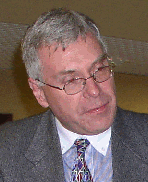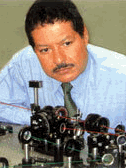
Peter Hall

Ahmed Zewail
|
Opinion- 23 November 2010 |
|
Peter Hall |
Peter Hall Comments on Ahmed Zewail's 'Curiouser and Curiouser: Managing Discovery Making' |
 Ahmed Zewail |
In the November 17, 2010 issue of Nature Ahmed Zewail, 1999 Nobel Laureate in Chemistry and a member of President Barack Obama's Council of Advisors on Science and Technology, detailed his reasons for urging that we: Beware the urge to direct research too closely. History teaches us the value of free scientific inquisitiveness*.
In this opinion piece Peter Hall§ uses Professor Zewail's "World View Column" as a basis to comment from an Australian's perspective.
_____________________________________________________
Ahmed Zewail's article is
powerful and instructive. For Australian scientists it comes at a pivotal time,
as we await the Australian Research Council's first Excellence in Research for
Australia, or ERA, report.
As Zewail points out, "creative minds and bureaucracies do not work
harmoniously together.'' However, the conflict between scientific minds and the
bureaucratic assessment of performance is only one of the challenges that we
face. Another is the mismatch between the bureaucratic needs that motivated the
design of ERA, and the other applications to which ERA methodology is being put.
ERA will contribute substantially to the Australian Government's annual Higher
Education Research Data Collection exercise, for example by providing new types
of information about research output and income. It will also be a major tool
for the Government's management of research, largely but not solely through the
distribution of research funding. However, motivated by ERA methodology, similar
data and similar tools are already being used by Australian universities to
manage scientists' careers, for example their hiring, their promotion and their
salaries.
There is admittedly a division of viewpoints on the appropriateness of managing
discovery-making through metrics, for example bibliometric analysis. Even so, it
would often be agreed that using ERA metrics to guide appointment and promotion
decisions is hazardous. The mathematician Andrew Wiles, who in 1995 published
the first proof of the then 358-year-old conjecture known as Fermat's Last
Theorem, is recorded by MathSciNet as having published only two
peer-review articles in the five-year period 1990-4. This numerically sparse
publication record would have been poorly regarded by some Australian
universities, where he'd have been a doubtful candidate for appointment or
promotion.
Other ERA protocols have drawn the ire of scientists and other researchers. They
include the ERA ranked journal list, which has met with both praise and
criticism from academics in Australia and abroad. Attention has been drawn too
to mismatches between research fields and two- and four-digit FoR codes, and
indeed the codes seem not to be good guides to research publication in a number
of important areas. Moreover, disparities between successes in Discovery Grant
competitions, and researchers' ERA bibliometric performance, have been noted
with concern and puzzlement. The ARC has argued vigorously that each of these
issues can and will be accommodated effectively in the ERA assessment. However,
this manifest confidence is conditional on ERA being interpreted (as was always
the ARC's intent) as an exercise in gathering data about the net performance of
individual universities, not of individuals within those institutions.
Zewail would surely take issue with some Australian universities' borrowing of
ERA metrics to assess, and thereby manage, the performance of our scientists. He
argues against "tightly managed research,'' and what could be more tight than
individual performance benchmarks that demand x papers in
y journals in z years?
_________________________________________
*Ahmed Zewail, Published online 17 November 2010 | Nature
468, 347 (2010) | doi:10.1038/468347a.
§Peter Hall, FAA, FRS is Professor of Mathematics and Statistics, The University
of Melbourne.